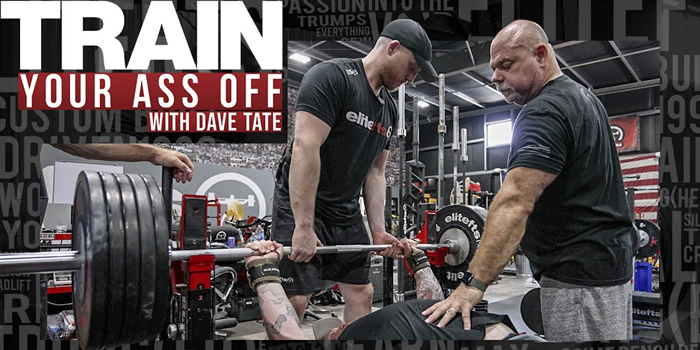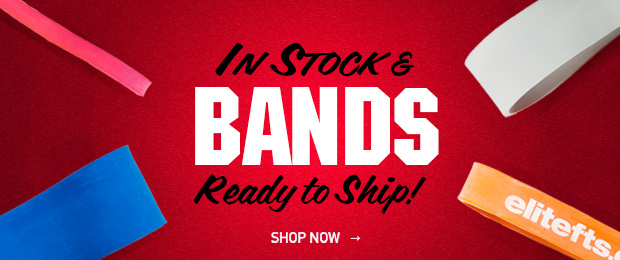
One of the most powerful experiences I've had as a coach and an athlete was to be selected for one of the first-ever Train Your Ass Off (TYAO) events here at elitefts.
It was a life-changing experience for me because I don't think I could have picked a worse time in my life to be selected—I was injured, out of shape, and I truly did not have the "spark" or the "drive" to train. I was bummed out, feeling like a Debbie Downer, and it showed. Shit, I didn't even have the money to attend, but I knew I needed to do whatever I needed to do to make this opportunity a reality. So I did what any fiscally irresponsible person would do, I threw that shit on a credit card, hopped on a plane, and hobbled my chubby little self to the compound to learn, grow, and get my ass trained off.
RELATED: 3 Things I Learned From Training My @ss Off with Dave Tate
At the Train Your Ass Off, I successfully accomplished all of these objectives, and then some. I received a new sense of direction and purpose in my training; I found out what was holding me back (physically, mentally, and technically) and how I needed to take responsibility for those decisions. I came for the training but left with the knowledge, direction, and fire to better help myself, my athletes, and the people around me. I even made a few coaching friends in the process.
You can see me reacting to some old footage that I found when I first started here at elitefts of me at this very event. Actually, this was the second time I came to the event. Fun fact: I was just a few weeks post meniscus repair (the same injury I lied about during the first TYAO), so Dave was pumped.
So now, with the passage of time, I find myself working for elitefts and coaching alongside Dave during the Train Your Ass Off events that single-handedly corrected the direction of my coaching career, athletic career, and overall path in life.
I get to help educate, coach, and learn from the athletes and coaches that attend. Everyone that walks through the door is different and comes from a different place, has a unique training history, injury history, and a wide range of successes, failures, fears, and goals. It is up to Dave and I to provide them with all the information they need to become better athletes or coaches and take accountability for themselves, their training, and the outcomes of that training. We help them discover skills and tools they have at their disposal to be the best they possibly can be in and outside of the weight room. Above all, the attendees get a better understanding of what it means to train hard.
Through these Train Your Ass Off experiences, interactions, and learning opportunities, I still find myself gaining new training insight and practical techniques while honing my coaching skills. So far, here are the top three things I have learned training YOUR ass off with Dave Tate.
1. Regardless of how strong you are, there is always room for improvement and growth by adopting a white belt mentality
We've had some tremendously strong and accomplished lifters come in to train, and regardless of their strength and skill level, they always have something they can improve on.
We prioritize:
- Better technical execution of a lift (yes, even amazingly strong and skilled lifters need to practice their technique).
- Seeing a clearer picture of what the true goals are (and an understanding of how to bridge any gap).
- Understanding the hows and whys of exercise selection, warm-ups/prehab, or effort level.
Lifters adopt a white belt mentality and come in with a notebook and pad in hand ready to learn and absorb as much as they can. It is that willingness to learn, try new things, develop new perspectives, and assimilate that information into what you are currently doing that leads to the biggest gains and success stories.
We love hearing how well attendees do three months, six months, or a year plus out from the event because that means that they got their money worth, and they're now in a position to help the people around them succeed—that is what we're after.
2. You CANNOT be passive when it comes to your training…even if you have a coach
A dangerous plague is beginning to rise in the strength athlete community. It is impacting athletes of all skill and strength levels and is something that Dave and I are trying to remedy through Train Your Ass Off events.
It's the passive athlete who blindly listens to their coach, cannot think for themselves, and does not take their own knowledge, experiences, and reality into play when it comes to training. I refer to this as being a backseat athlete.
Now, I am not saying that someone is wrong for working with a coach, nor am I saying to become a pain in the ass for your coach and second guess every decision made. The guidance and direction are great if a good coach helps elevate your knowledge, educates on what is needed, and helps build a knowledge base on how to get better over time.
What I am saying is that if you're not actively involved WITH your coach in the decision making for your program, asking questions, giving feedback, and taking an active role in the direction of your own training, then you are not only getting subpar results, but you are never going to truly learn about what YOU need to grow, develop, and progress. It is as simple as starting with understanding the WHY behind the decisions being made, asking better questions about the things you are experiencing, and having that open communication necessary for the coach and athlete relationship to be lucrative for both parties.
There are programs everywhere that work for the majority of people who want to get a little bit stronger, put a few pounds on their total, and be a bit more jacked. But, the higher up you go in terms of skill, strength, and experience, the less you can rely on cookie-cutter programs or generic advice from a coach. There's a point when you have to rely on your own experiences and start taking inventory.
3. Your form STILL sucks, and you STILL aren't training as hard as you think…but that is OK
If you read my article on my Train Your Ass Off experience, then this will not come as a surprise to you. It doesn't matter who you are, where you train, or what sort of training philosophy you have. The point remains that your form can always be improved, and you can give more effort in the gym.
These are not bad things, and this is not me belittling any of the people who have participated in any of the TYAO events in the past or future. People train with the same people for years and fall into a rut without even noticing, or they train by themselves in a garage gym, or worse yet…they train by themselves in a COMMERCIAL gym surrounded by people not talking to each other, with their headphones on, all doing the same exercises. You hate to see it.
The good news is that when someone jumps into a TYAO event, they get put under the proverbial microscope and are given all the time in the world (usually 12-20 hours depending on the style of TYAO) with Dave and myself to just focus on their training, their execution of the lifts, and their program and goals.
I tell every group that comes in as they are standing awkwardly in the corner, not knowing what to do, and being overwhelmed by the experience, that the whole weekend is about them. It's your home, and we are here to help you with anything you need to better reach your training and performance goals.
I understand firsthand how intimidating it can be.
I understand how even being selected for this opportunity makes you think that you aren't strong enough to do it or that you are going to look stupid.
Those are all genuine and valid feelings. Remember, you were selected because you are strong enough, and now is your time to live, learn, and develop your skills and abilities.
So for those of you who are on the fence about throwing your name in the hat for a future Train Your Ass Off event, understand the time you spend here will change your life and open your eyes to a whole new level of training and performance.
Sam Brown is a coach at elitefts, developing the next generation of coaches and athletes. Owner of Practice Movement and Recovery LLC, he consults clients to get out of pain and boost performance—one of the few McGill Method Practitioners in the United States. He’s a strongman and competes in the 198- to 200-pound weight class.












Hope to hear from you,
Mai